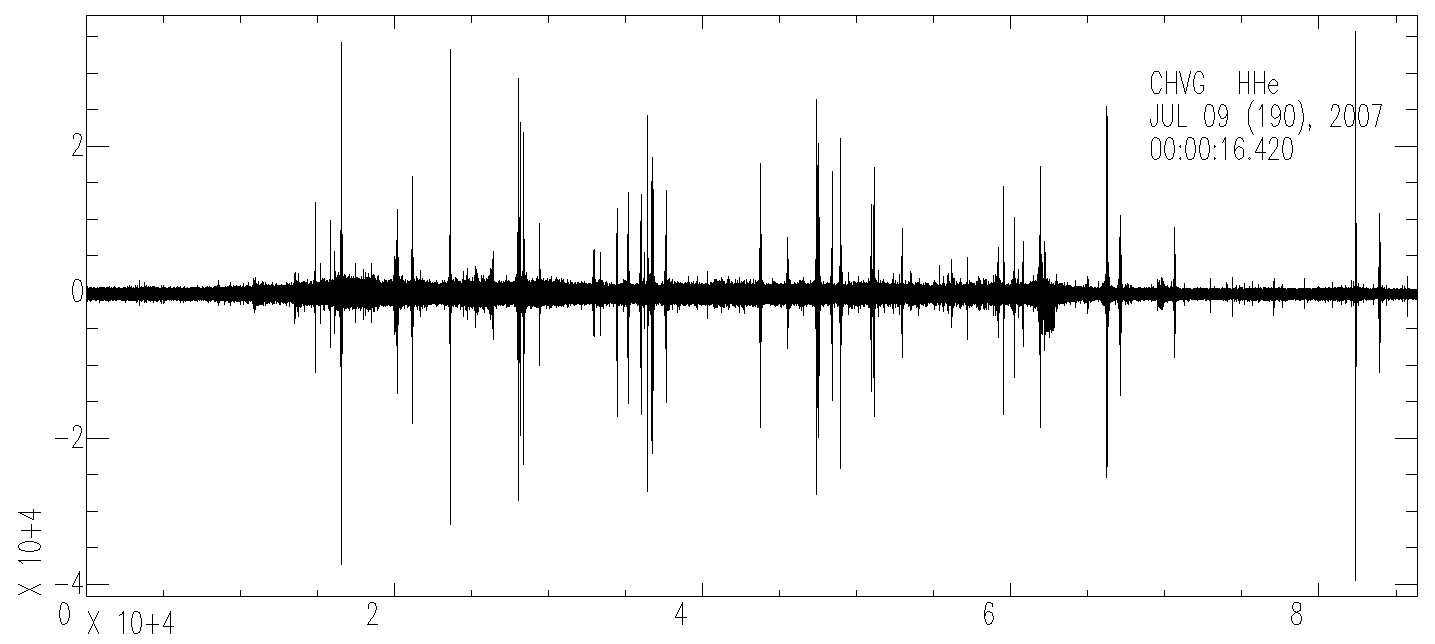I’m getting ValueError when trying to convert mseed files to SAC, or even when plotting the data, or merging them.
I am using python 2.7 and Obspy 0.10.2 on Ubuntu 14.04. (I have got same error with Obspy 1.0.0).
read() function read this files without warnings or errors. encoding of mseed is ASCII and dtype is ‘|S1’.
This mseed files can be opened using SHM without problem. So i think there is not issue with files itself.
Script:
import functions,sys,MySQLdb,glob,obspy,os,numpy;
numpy.set_printoptions(threshold=numpy.nan)
hostname = “127.0.0.1”
username = “st_user”
password = “qwert”
database = “earthquakes”
db = MySQLdb.connect(hostname,username,password,database)
cursor = db.cursor(MySQLdb.cursors.DictCursor)
storage = “/home/sysop/Projects/Mseed2SAC/sac_files/”
merge_method = 1
gap_fill_value = 0
for id_ in sys.stdin:
sql_query = "SELECT primaries.id, primaries.networkCode, primaries.stationCode, primaries.locationCode,
earthquakes.eq_key FROM primaries INNER JOIN earthquakes ON earthquakes.id = primaries.eq_id AND
primaries.eq_id = %s WHERE networkCode = ‘GO’ or networkCode = ‘KO’ or networkCode = ‘TU’ or
networkCode = ‘II’ or networkCode = ‘IU’ " % id_
cursor.execute(sql_query)
primaries = cursor.fetchall()
year, month, day, hour, minute, second, doy, eq_time = functions.eqkey_parser(primaries[0][‘eq_key’])
path = str(‘%s%s/%s/’ % (storage, str(year), id_.rstrip(‘\n’))) # id_ -s boloshi aqvs \n. rstrip-it vashoreb.
if not os.path.exists(path):
os.makedirs(path)
for station in primaries:
st_name = station[‘stationCode’]
net_code = station[‘networkCode’]
loc_code = functions.get_location(st_name, net_code)
ies_loc_code = station[‘locationCode’]
file_regex_path = functions.file_full_path(year, net_code, st_name, loc_code, doy)
file_path = glob.glob(file_regex_path)
if st_name == “CHVG”: # this is just for reading only problematic files
if file_path:
for file in file_path:
st = obspy.core.read(file, starttime = eq_time-15, endtime = eq_time+300)
channel = st[0].stats.channel
if len(st)>1:
st.merge(method=merge_method, fill_value=gap_fill_value) # gawyvetili an gadafaruli failebis gadabma.
file_name = st_name + “.” + net_code + “.” + ies_loc_code + “.” + channel + “.SAC”
st.write(path + file_name, format=‘SAC’)
else:
print “File Not Found ,”, id_.rstrip(), “,”, st_name, “,”, net_code, “,”, file_regex_path
Error output:
>>> echo 11479 | python ./mseed2sac.py
Traceback (most recent call last):
File “./mseed2sac.py”, line 38, in
st.write(path + file_name, format=‘SAC’)
File “/usr/lib/python2.7/dist-packages/obspy/core/stream.py”, line 1418, in write
writeFormat(self, filename, **kwargs)
File “/usr/lib/python2.7/dist-packages/obspy/sac/core.py”, line 441, in writeSAC
_writeSAC(trace, fh, byteorder=byteorder, **kwargs)
File “/usr/lib/python2.7/dist-packages/obspy/sac/core.py”, line 471, in _writeSAC
t = SacIO(trace)
File “/usr/lib/python2.7/dist-packages/obspy/sac/sacio.py”, line 287, in init
self.readTrace(filen)
File “/usr/lib/python2.7/dist-packages/obspy/sac/sacio.py”, line 787, in readTrace
starttime=trace.stats.starttime)
File “/usr/lib/python2.7/dist-packages/obspy/sac/sacio.py”, line 342, in fromarray
self.seis = np.require(trace, native_str(‘<f4’))
File “/usr/lib/python2.7/dist-packages/numpy/core/numeric.py”, line 649, in require
return asanyarray(a, dtype=dtype)
File “/usr/lib/python2.7/dist-packages/numpy/core/numeric.py”, line 512, in asanyarray
return array(a, dtype, copy=False, order=order, subok=True)
ValueError: could not convert string to float: )
This is the st[0].data output :
[‘\x02’ ‘\xe3’ ‘\x01’ ‘\xd2’ ‘’ … ‘\x0f’ ‘*’ ‘\xaa’ ‘\xaa’ ‘\xaa’]
You can download example of miniseed file from the following link:
https://drive.google.com/file/d/0B7Sj7pYqfJc6X0xzM0ZLLVJxWjQ/view?usp=sharing
P.S: This problem dose not occur with steim1 and steim2 ecnoded mseed files. Only whit ASCII encoding.
